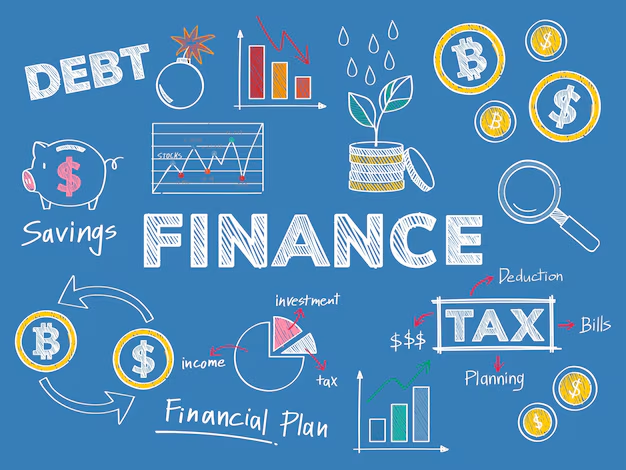Personal finance is the art of managing your money in a way that helps you achieve both your short-term and long-term financial goals. Whether you are planning for retirement, saving for a large purchase, or simply trying to stay on top of your day-to-day expenses, understanding the basics of personal finance is essential. It involves a variety of activities, such as budgeting, saving, investing, and protecting yourself against financial risks.
In this article, we’ll explore the key components of personal finance and offer practical tips to help you take control of your money, reduce financial stress, and build a secure financial future.
1. Creating a Budget
The foundation of managing your personal finances begins with creating a budget. A budget is a detailed plan that outlines how much money you have coming in (your income) and how much money you need to pay for your expenses. Creating a budget helps you make informed decisions about where to spend your money and how to save for your goals.
- Track Your Income and Expenses: Start by listing all your sources of income, such as your salary, business income, or any other sources of revenue. Next, record your monthly expenses, including rent or mortgage, utilities, food, transportation, and discretionary spending like entertainment.
- Use the 50/30/20 Rule: A helpful guideline for budgeting is the 50/30/20 rule. This suggests allocating:
- 50% of your income to needs (housing, utilities, insurance)
- 30% to wants (entertainment, dining out, vacations)
- 20% to savings and debt repayment (emergency fund, retirement savings, loan repayment)
- Prioritize Savings: Once you’ve created a budget, ensure that savings and debt repayment are given priority. It’s essential to pay yourself first, meaning you should save or invest before spending on non-essential items.
2. Building an Emergency Fund
An emergency fund is a crucial element of personal finance that acts as a safety net during unexpected financial setbacks. Whether it’s a job loss, medical emergency, or urgent home repair, having an emergency fund helps prevent you from going into debt when life’s surprises occur.
- How Much to Save: Experts recommend having three to six months’ worth of living expenses saved in an easily accessible account, such as a savings account. This will give you a cushion in case of unforeseen circumstances.
- Start Small: If you’re not able to save this much right away, don’t worry. Start small, even if it’s just $100 or $200 a month, and gradually build up your emergency fund over time.
- Keep It Accessible: Your emergency fund should be easily accessible, but not so easy that you dip into it for non-emergencies. Consider putting it in a high-yield savings account where it can earn interest while remaining liquid.
3. Managing Debt
Debt can be a major source of stress and financial instability if not managed properly. Understanding how to effectively manage debt is a key component of personal finance.
- Understand Different Types of Debt: Debt comes in different forms, including credit card debt, student loans, mortgages, and personal loans. Credit card debt tends to have high-interest rates, so it’s important to prioritize paying it off quickly.
- Debt Repayment Strategies:
- Debt Snowball Method: This involves paying off your smallest debt first, then using the money freed up to pay off the next smallest debt, and so on. It’s a good strategy for building momentum and motivation.
- Debt Avalanche Method: This method focuses on paying off the debt with the highest interest rate first, saving you the most money in the long run. It may take longer to see progress, but it’s more cost-effective.
- Avoid Taking on More Debt: When you’re working on paying off debt, avoid taking on more. Try to refrain from using credit cards for unnecessary purchases and focus on living within your means.
4. Saving and Investing for the Future
While budgeting and managing debt are essential, saving and investing for the future should also be a priority. Saving for short-term goals (like a vacation or a car) and long-term goals (like retirement or buying a home) helps ensure your financial security in the future.
- Start with Retirement Savings: If your employer offers a 401(k) or similar retirement plan, try to contribute as much as you can, especially if they match your contributions. This is free money that will compound over time, helping you build wealth for retirement.
- Diversify Your Investments: Investing is a way to grow your wealth over time. Consider a mix of stocks, bonds, mutual funds, and real estate. Diversifying your investments helps spread risk and increase your chances of earning returns. If you’re new to investing, you might want to start with low-cost index funds or exchange-traded funds (ETFs).
- Automate Savings and Investments: Set up automatic transfers from your checking account to your savings or investment accounts. By automating the process, you make it easier to consistently save and invest, helping you stay on track to meet your goals.
5. Protecting Your Finances
Protecting your finances involves preparing for unexpected risks that could impact your income, health, or property. This includes getting the right types of insurance and planning for future contingencies.
- Health Insurance: Health insurance is essential for protecting yourself against unexpected medical expenses. Without it, medical bills could be financially devastating. Make sure you understand your plan’s coverage and premiums, and consider getting additional coverage if needed.
- Life Insurance: Life insurance provides financial support to your dependents in the event of your death. This is especially important if you have children or others who rely on your income. Choose a policy that fits your family’s needs.
- Disability Insurance: Disability insurance helps replace lost income if you become unable to work due to illness or injury. Many employers offer short- or long-term disability insurance, but if not, you can purchase your own.
- Homeowners/Renters Insurance: Whether you own or rent, having property insurance protects your assets in case of damage, theft, or liability claims. Review your policy regularly to ensure adequate coverage.
6. Improving Your Credit Score
Your credit score is a numerical representation of your creditworthiness. Lenders use it to determine whether you qualify for loans or credit cards, and what interest rates you’ll pay. A higher credit score can save you money by giving you access to lower interest rates.
- Pay Bills on Time: One of the most important factors in your credit score is your payment history. Make sure to pay your bills on time, as missed payments can significantly hurt your score.
- Keep Credit Utilization Low: Your credit utilization ratio is the percentage of your available credit that you’re using. Ideally, it should be under 30%. Try to pay down your credit card balances or request a higher credit limit to keep this ratio in check.
- Check Your Credit Report: Regularly check your credit report for errors or signs of identity theft. You can get a free credit report once a year from the three major credit bureaus—Equifax, Experian, and TransUnion.
7. Planning for Major Financial Goals
Personal finance isn’t just about managing your day-to-day expenses; it’s about planning for major life events, such as buying a home, sending your kids to college, or retiring comfortably.
- Set Clear Goals: Establish short-term and long-term financial goals. Make sure they are specific, measurable, achievable, relevant, and time-bound (SMART goals). For example, a short-term goal might be saving for a vacation, while a long-term goal could be building a retirement nest egg.
- Create a Plan: Once you’ve set your financial goals, create a plan to achieve them. This includes budgeting, saving, and investing in a way that aligns with your objectives.
- Review and Adjust Your Plan: Life circumstances change, so it’s essential to periodically review your financial goals and make adjustments as needed. This ensures you stay on track and can adapt to unexpected situations.
Conclusion
Managing your personal finances effectively is key to achieving financial stability and building a secure future. By budgeting, saving, investing, managing debt, protecting your finances, and planning for future goals, you can take control of your money and make informed decisions that will improve your financial well-being. It may take time and discipline, but with the right strategies, you can achieve your financial objectives and enjoy a more secure, stress-free financial future.

